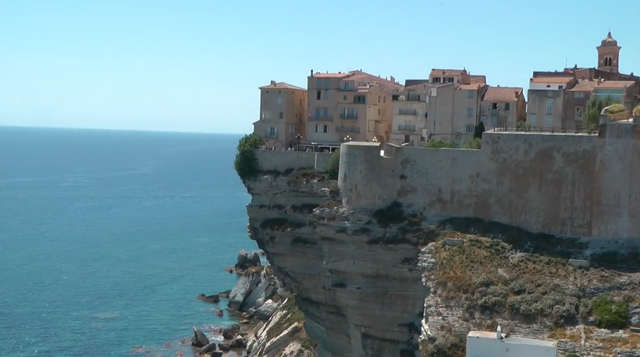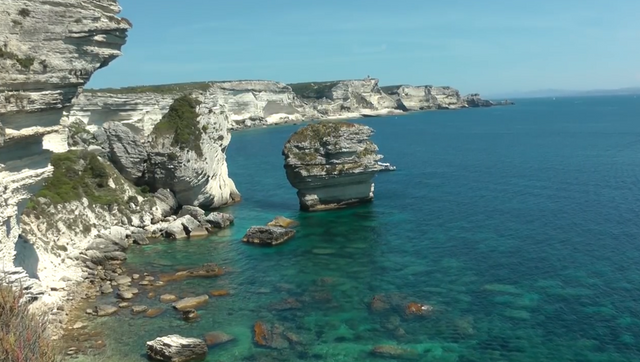A tour of the coastal towns of Corsica in 7 days: from Ajaccio to Calvi.
I keep telling you about the tour we did on the island of Cárcega in the summer of 2018.
From Ajaccio we already talked about in this post. Its natural beauty, its monuments, its popular festivals.

The island capital is the untouched queen of tourism. Its natural beauty, its monuments, its popular festivals. The island capital is the untouched queen of tourism.

After staying for a couple of days in the capital, we continue towards the west coast (from south to north).
A wild and natural route passing through towns that seem to have been immobilized in history.
Some of them accessible only by sea.
Sagone.
-ruta-transito.png)
25 km from Ajaccio and after a mountain road with several curves we find the Gulf of Sagone and then the town that bears his name.
.png)
A coastal town with charming beaches, fascinating bays where very few tourists are seen, mountain lakes, trails, forests, rivers and a characteristic historical center of mountain towns: typical products and tranquility far from the madding crowd.
-panorama.png)
Ideal to rest after a hot summer day on the Chiuni beach, 800 meters of fine sand to enjoy the sun and crystal clear water.
-playa.png)
You can visit the ruins of Saint-Appiano old church built on an ex-menhir
Cargèse.
We barely do 12 kms after leaving Sagone and we reach Cargèse. From this town the entire panorama of the Gulf is dominated.
-iglesia.png)
The two very beautiful churches contribute to increase the charm of this town: a Greek and a Latin one.
-pueblo.png)
Small squares with trees, a large number of orchards and house gardens adorned with flowers.
-panorama.png)
Piana.
It is a tiny little town on the west coast of Corsica known for its calancas.
-casas-de-piedra.png)
Sculpted on the rocks by the Mediterranean winds, they are a spectacular natural site declared a UNESCO World Heritage Site in 1983.
-casas-de-piedra-1.png)
According to the locals, its historical and cultural value is of such magnitude that it can be considered one of the two natural treasures of the island of Corsica.
-panorama.png)
The other is the Scandola Marine and Land Nature Reserve.
-iglesia.png)
Porto.
-bahia.png)
Another place that is inscribed in the World Heritage of Humanity is Porto.
-buma-mattutina.png)
We have already said that a third of the island of Corsica is a natural heritage. And seeing these places fully confirms it.
-panorama-promontorio-pueblo.png)
Its most outstanding construction is the Genoese tower that dominates from the top.
-panorama-promontorio-torre.png)
Closer and closer to Calvi we find the Fango stream.
River Fango arriving at Ota.
-fiume.png)
The Fango River is widely known for its crystal clear waters and its beautiful and spacious rocky basins.
-fiume-1.png)
The banks of the river are easily accessible by a parallel path on one side and by the path, "Entre Mar y Montes", on the other.
The stream is an excellent option for avid walkers on hot summer days.
-fiume-2.png)
The trail along the bank is easy and requires only sturdy footwear. The riverbed walk, however, requires some physical fitness in both swimming and wading.
-fiume-e-montagna.png)
Tip: a kayak excursion in the Fango delta near Galéria is worth it
Galéria.
-casas.png)
And, near Calvi, we commission Galéria.
As in the rest of the coastal towns that we have crossed, its population does not even reach 500 inhabitants.
-iglesia.png)
Excellent excuse to keep them away from any type of environmental contamination.
-municipio.png)
It is located near the mouth of the Fango river and is part of the Corsica Regional Natural Park.
-plaza.png)
Perhaps it is not the most beautiful beach that we have visited, but it is surely the quietest and least populated.
La Revellata.
-faro.png)
We already talked about Ajacc Before arriving at Calvi we find the La Revellata peninsula at the tip of which is the Revellata Lighthouse or the Calvi Bay Lighthouse.
-panorama.png)
This peninsula has a unique natural wealth and the seabed is a paradise for diving lovers.
-panorama-1.png)
There is also a wild but beautiful natural environment, ideal for hiking and trekking.
-panorama-2.png)


Comments
Post a Comment